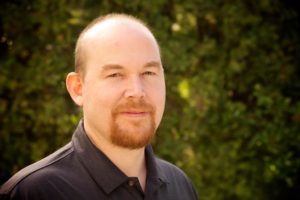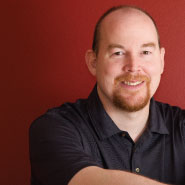
Tall, athletic and active, Stefan Ward, PhD, an associate professor at Central Washington University, seemed the image of good health.
Then, fate tossed him a life-threatening curve – and a partnership between Kittitas Valley Healthcare and Virginia Mason Medical Center in Seattle helped him survive it.
In 2011, the fingers of his left hand began tingling, twitching and then going numb. “It felt like pins and needles,” Ward says.
Ward, whose doctorate is in sports and exercise, figured it for a pinched nerve – and ignored the problem for a year. In 2012, he mentioned it to his primary care provider. Over time, the frequency, intensity and the duration of the symptoms increased, recovery took longer and the symptoms had spread up his arm. Even after multiple referrals to specialists and extensive diagnostic testing, no one had an answer.
A neurologist he saw in Yakima suggested it might be the start of MS. A friend remarked that her grandfather, who had ALS, experienced similar symptoms.
By 2013, Ward was desperate. Whatever was wrong had affected his proprioception, the ability to know where a limb is in terms of space. Simple tasks like closing his eyes and touching his nose with his left hand had become impossible.
“When it got to my face I knew we had to do something,” says Ward, who tried physical therapy, occupational therapy, acupuncture and chiropractics – “basically anything my insurance would cover.”
Still, nothing helped.
Enter Dr. Charles Nussbaum, a neurosurgeon with Virginia Mason Medical Center in Seattle. Through a partnership with Kittitas Valley Healthcare, Nussbaum averages two days a month in Ellensburg doing consultations – primarily for spine-related issues – at KVH Physical Therapy. In 2014, Ward’s doctor suggested Ward meet with Nussbaum. After the consultation, Nussbaum asked Ward to come to Virginia Mason for further evaluation.
“I had a bunch of appointments and tests,” Ward recalls. Doctors ruled out MS. But at the end of the day, there was still no answer. Nussbaum scheduled a brain MRI at KVH Hospital, prescribing valium to relax Ward’s muscles.
Ward came home from the hospital, took a nap and woke to find multiple calls from Nussbaum’s office.
The diagnosis? A baseball-sized tumor growing between his skull and his dura, the outermost lining of the brain and spinal cord, was compressing his brain. The result was myoclonic seizures that caused symptoms of numbness, tingling and twitching. The good news: the tumor, probably the result of full brain radiation Ward had as a child battling leukemia, was an atypical benign meningioma – and not malignant.
When Ward said he didn’t want to drive to travel to Seattle just to set up whatever came next, Nussbaum called back. “I said, ‘We’re going to do surgery, right?’” Ward says. “He said that would be his recommendation.” Ward asked Nussbaum to schedule the surgery.
“Within three weeks I was at Virginia Mason,” Ward says. On a Friday in April 2014 doctors performed an angiogram to cut off blood to the tumor. The following Monday, he had surgery to remove the tumor. On Wednesday he went home to Ellensburg.
Six months later, when an MRI showed that part of the tumor had begun to grow back, Ward underwent 32 radiation treatments. He continues to get an MRI every three months.
Although he still has some residual symptoms, Ward says the improvement after his surgery was dramatic and immediate. Grinning, he leans back in his chair and tosses a small ball against the wall of his office, deftly catching it with his left hand, a feat that had become impossible before his surgery.
Finally getting a diagnosis “was awesome,” Ward says. “I never thought I’d say “thank God I have a benign brain tumor.’ But it wasn’t MS or ALS.”
Nussbaum, he says, was a lifesaver.
“If I hadn’t seen Nussbaum or if I’d gone to someone less qualified I’d be dead or have more brain damage,” he says. “He gives you the straight facts, is super solid and has a great bedside manner. He’s awesome – a great guy.”
